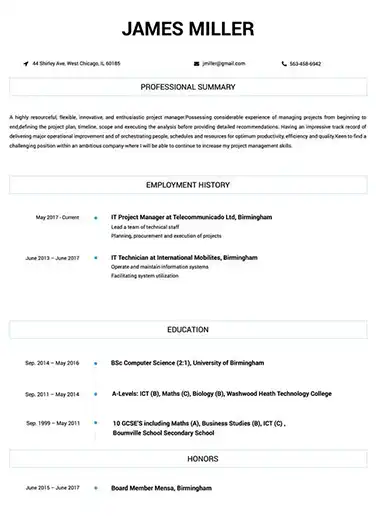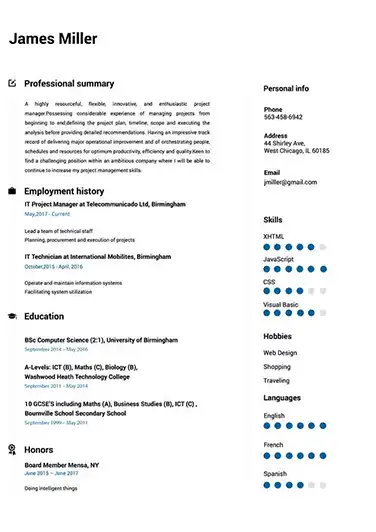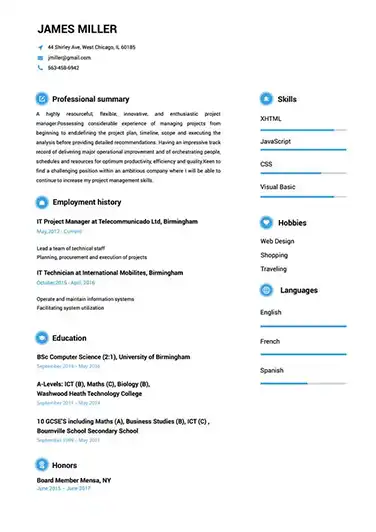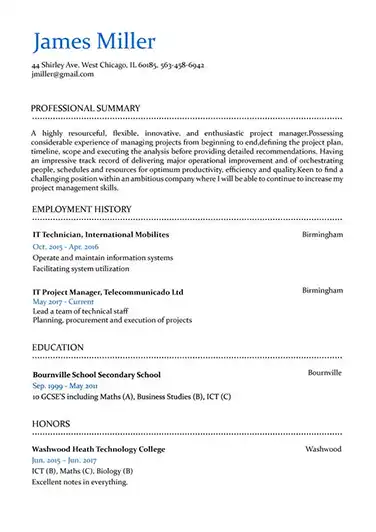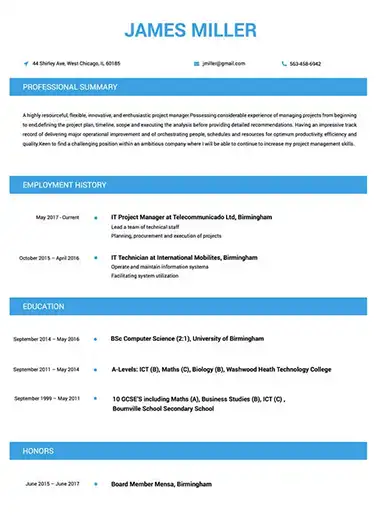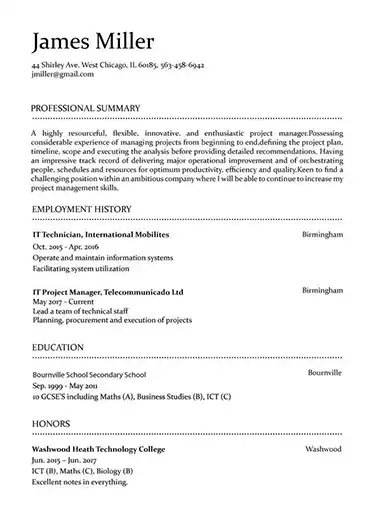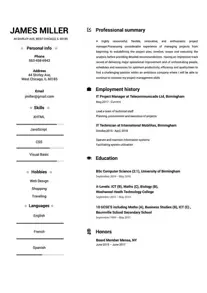 Use This Template
Use This Template
Build your resume in 15 minutes
Create an awesome resume that meets the expectations of potential employers with our selection of professional, field-tested resume templates.
executive: Resume Samples & Writing Guide
daniels_virginia@icloud.com
876-757-7654
Employment history
- Collaborate with other departments to ensure efficient operations
- Ensure compliance with legal and regulatory requirements
- Develop and manage business partnerships
- Develop and manage business partnerships
- Lead, motivate, and develop staff
- Develop and implement business strategies, plans, and procedures
- Develop and implement effective marketing and sales strategies
- Create and manage business plans and budgets
- Develop and implement business strategies, plans, and procedures
Education
Skills
Do you already have a resume? Use our PDF converter and edit your resume.
owenhawkins88@aol.com
674-433-6924
Professional Summary
Employment history
- Monitor and analyze performance metrics
- Generate reports on performance and progress
- Develop and maintain relationships with key stakeholders
- Develop and implement business strategies, plans, and procedures
- Ensure compliance with legal and regulatory requirements
- Create and manage business plans and budgets
- Oversee daily operations of the business
- Develop and implement business strategies, plans, and procedures
- Monitor competitors and industry trends
Education
Skills
gray.mark@yandex.com
829-125-0459
Professional Summary
Employment history
- Lead, motivate, and develop staff
- Collaborate with other departments to ensure efficient operations
- Monitor and analyze performance metrics
- Oversee daily operations of the business
- Create and manage business plans and budgets
- Generate reports on performance and progress
- Monitor competitors and industry trends
- Manage budgets and financial plans
- Develop and implement business strategies, plans, and procedures
Education
Skills
hall-quinn@protonmail.com
871-827-4022
Employment history
- Monitor and analyze performance metrics
- Ensure compliance with legal and regulatory requirements
- Develop and implement effective marketing and sales strategies
- Develop and implement effective marketing and sales strategies
- Collaborate with other departments to ensure efficient operations
- Identify and resolve issues in a timely manner
- Develop and manage business partnerships
- Ensure compliance with legal and regulatory requirements
- Generate reports on performance and progress
Education
Skills
johnsonzoe@yahoo.com
680-085-6806
Professional Summary
Employment history
- Collaborate with other departments to ensure efficient operations
- Analyze market trends and determine business growth opportunities
- Ensure compliance with legal and regulatory requirements
- Develop and manage business partnerships
- Oversee daily operations of the business
- Create and manage business plans and budgets
- Identify and resolve issues in a timely manner
- Generate reports on performance and progress
- Ensure compliance with legal and regulatory requirements
Education
Skills
Not in love with this template? Browse our full library of resume templates
“Management is about arranging and telling. Leadership is about nurturing and enhancing.” This quote from business writer Tom Peters could easily be used to highlight the world of difference between a good executive versus a great one.
Executives need to offer a plethora of qualities that leave no doubt in the minds of their team that they’re worthy of this C-suite job. It’s no ordinary job, after all. It’s a high-powered, high-pressure, and also high-paying one.
Given the prestige and importance of being an executive (and the paypacket that generally comes with it!), employers and recruiters are cautious to not just hire a candidate who seems to have the attributes that are necessary to excel. They want to hire someone who can provide substantial evidence that they are the best hire for the job.
So how do you convince the recruiters that you’re that person? You need to apply with an incredibly strong executive resume. However, in order to do so, you’ll need to have one in the first place!
If you need some pointers on how to create an incredible resume for a CEO, CIO, CTO, or CMO position that persuades recruiters and companies to hire you - read this detailed expert writing guide. We’ve shared a treasure trove of insider secrets about how to score your next executive job. After reading this guide, you’ll be able to
- Format your resume correctly
- Determine which skills are valuable to mention
- Convincingly highlight your most suitable achievements
- Write a strong resume summary
- Make your resume stand out
We’ve even shared how you can fastrack making your resume using a resume builder! If you’re ready to start working in your dream executive position, this guide will teach you everything you need to know.
1. Multiple Template Examples
2. How to Write an Executive Resume That Will Get You the Job
How to format your executive resume
Many job seekers solely focus on the contents of their resume and disregard the importance of formatting their resume correctly. As you will already have a plethora of experience behind you as a current or aspiring CEO, CIO, CTO, or CMO, you should use a format that is designed to put center focus on your achievements.
The format that does this most effectively is reverse-chronological format. It does a fantastic job of showcasing your impressive career progression by highlighting your most recent work experience first, followed by your previous ones.
The layout you choose is yet another important consideration to keep in mind as you’re piecing it together. There are particular layout rules that resume experts agree will help you create a resume, which positions you as a consummate professional. To save you the trouble of finding these rules for yourself, we’ve summarized the most vital ones to follow below:
- Number of Pages: Generally, 2 to 3 pages. However, some companies may request you submit a longer or shorter resume, so be sure to check any specific requirements provided.
- Fonts to Use: Stick to classic fonts such as Garamond or Arial.
- Fonts to Avoid: Don’t use any fonts that will make a recruiter question your professionalism, such as Impact or Vanguard.
- Margins: 1 inch on all sides.
- Line Spacing: 1 or 1.15.
- Header size: 14-16 point size.
- Text size: 11-12 point size.
The primary differences between resumes for CEO, CIO, CTO, and CMO positions
While the formatting, layout and section names for CEO, CIO, CTO, and CMO resumes are the same across the board, the contents of each resume will differ. Recruiters for each of these positions are seeking candidates who are able to offer profession-specific attributes, educational background, skills, and work experiences, in addition to general leadership qualities.
For example, the ideal educational background on a CMO resume is a bachelor’s degree in marketing and a Master of Business Administration in marketing. In contrast, the ideal educational background on a CTO resume is a 4-year STEM degree and a Master of Business Administration in information technology.
What recruiters will look for
Recruiters are looking for a candidate who has proven themselves to be a highly-performing executive, or who has demonstrated their strong potential to become one. There isn’t just one quality that makes an excellent executive - it is dependent on a combination of the right educational background and training, hard and soft skills, and professional experiences.
That being said, there are certain attributes all great executives have. Harvard Business Review highlights that effective executives follow the same 8 practices. That is, they:
- Ask, “What needs to be done?”
- Ask, “What is right for the enterprise?”
- Develop action plans.
- Take responsibility for decisions.
- Take responsibility for communicating.
- Focus on opportunities rather than problems.
- Run productive meetings.
- Say “we” rather than “I.”
In addition to these general attributes, every recruiter will have a certain vision in mind for what the “perfect” executive looks like for each job. After all, the responsibilities an executive needs to carry out and the skills they need to utilize are shaped by each specific role and company.
Essentially, recruiters want to track down a candidate who is able to offer both general leadership skills as well as the specific skills needed to perform strongly in the job they’re hiring for. The way they do this is by sorting through the hundreds, if not thousands, of resumes they receive. To ensure your resume is in line with what recruiters are looking for, just follow the expert tips we have featured throughout this guide.
What skills to mention and how to do it correctly
The unique skills you offer as an executive are your secret weapon to snagging your dream job. That is, provided you know which ones to mention for each job application!
Cramming your resume with a random assortment of skills you possess won’t have the effect you intend it to have. Rather than being impressed, recruiters will think that you haven’t properly understood what they’re looking for.
Recruiters very clearly list the precise skills they are after in each job ad, so don’t be caught out by failing to include them on your resume. Focus on showcasing the relevant skills you have, that will support you to ace the particular job you’re applying for.
As you will soon discover after looking through countless job ads, the skills recruiters are looking for will depend on each job. You’ll also notice that they tend to fall into two types of skills: hard/technical and soft/interpersonal skills. To get a better idea of which skills you may come across on your job ad, we’ve shared some of the most sought after CEO skills we found listed in real job ads. Take a look for yourself
Hard skills
- Increasing earned revenue from operations and membership.
- Developing strategies that increase customers.
- Managing the annual calendar and agenda development.
- Ensuring that the company is seen as an industry leader.
- Serving on the boards, task forces, and similar community/organizational entities.
- Partnering with high-level officers to grow the company.
Soft skills
- Serving as the leading external face and voice of the company.
- Leading collaborative activities internally and externally.
- Overseeing the plans and activities of staff.
- Driving shared and measurable goals.
- Have experience working with people of different cultures and needs.
- Communicating regularly with company leadership.
Now that you know how to select which skills to hone in on, you will need to learn how to do so correctly. There are quite a few sections you should feature your skills in:
You should be sure to feature 6 to 8 skills in a dedicated “Skills” section. Be mindful that you should only list your top skills in the skills section, and not go into lengthy details about each of them. For example, your skill in executing effective marketing campaigns should not look like this in your skills section:
- Execute effective marketing campaigns that lead to a 200% growth in quarterly revenue.
Instead, it should only state what the skill is, with no other details, such as the example below shows:
- Execute effective marketing campaigns.
How, then, can you provide more details about your skills? Incorporating them into your work experience section. Aim to include at least one relevant skill per achievement. If you’re able to, it’s also a good idea to mention one or two in your resume summary as well.
Pro tip: A good test to see whether you have made your skills relevant enough is to determine if it’s clear from your skills whether you’re applying for a CEO, CIO, CTO, or CMO position. While there will indeed be crossover in the desired skills of these different C-suite jobs - particularly in terms of soft skills - most skills you will need to list will be profession-specific.
How to highlight your achievements
Making your achievements shine on your resume requires you to not only understand which achievements are most advantageous for you to feature, but also how to do so impactfully. Although this sounds challenging, we’re going to let you in on a little secret: each job ad is filled with clues about which achievements you should include.
We’ve said it time and time again throughout this guide, but we can’t overstate the fact that recruiters are looking to see if your resume contains information about your professional achievements that are relevant to the job at hand. By implication, you will need to frame your achievements so they reflect the qualities and experiences each recruiter is after.
To do this well, it isn’t good enough to plainly note down what you did in each role. Rather, you need to emphasize the positive results of your actions and highlight how they shaped the company for the better.
To help make this all clearer, compare the following examples of the same achievement written in two different ways. Both were written to address a criterion we found in a real job ad: “Proactively manages KPI’s and adjusts strategy as necessary”:
- Managed KPI’s and made some positive changes to the company’s marketing strategy.
- Boosted online marketing revenue by 240% by proactively managing KPI’s and adjusting the company’s marketing strategy from being PPC focused to SEO focused.
Which achievement better addresses the criterion and sounds more impressive to you?
You’ll, no doubt, agree that the latter achievement sounds far superior. The former achievement is uninspiring and vague, and would make the recruiter question whether the candidate had really achieved what they said they did - which, in fact, isn’t very much.
Whereas, the latter achievement smoothly incorporates keywords from the criterion, which in turn shows that they tailored their resume to the needs of the specific job (more details are discussed about this in a section below). It also provides the recruiter with a concrete example, which works to highlight the result of their actions.
To sum up - don’t make a recruiter guess how your achievements relate to the job you’re applying for - communicate these connections clearly when writing each of your job descriptions.
How to write a resume summary (including examples)
The first part of your resume a recruiter will read is your resume summary. Beyond being the first section after your contact details, it also provides recruiters with an invaluable insight into why you believe you’re the best candidate for the job.
If your resume summary is well-written and persuasive, it has the power to positively shape a recruiter’s impression of you from the get-go. Conversely, if it’s sloppily written, it can make them disregard your application entirely, or at least make them question your suitability for the role.
So how do you write an excellent resume summary, which will get a recruiter on your side from the start? Just like you did for your resume achievements - you need to make connections between what a recruiter is seeking and what you can offer to fulfill these needs.
In short, your resume summary needs to be tailored to reflect the attributes of an ideal candidate. It also needs to convey why your skills, experience, and passion makes you this candidate.
For example, if you’re applying for a CTO position in an education company, your resume summary shouldn’t look generic like this:
- CTO with 14 years of experience in various settings, who specializes in improving development performance. Volunteers at various girls in STEM organizations.
It should include eye-catching details about you as a professional, that demonstrate why the recruiter should consider you for that specific position.
- CTO with 14 years of experience, including 2 years in the education sector, who specializes in reviewing and optimizing development performance against operating plans, standards, and established metrics. Holds a strong passion for the power of education, as evidenced by volunteering at various girls in STEM organizations.
In short, your resume summary needs to be tailored to reflect what a recruiter is looking for and convey why your skills, experience, and passion make you the perfect person for the job.
Pro tip: Whichever executive position you’re applying for, be sure to include a resume summary and not a resume objective. Resume objectives are similar to resume summaries, however, there are some notable differences which make them only appropriate for entry-level job seekers.
How to list any additional details, like training, certifications, volunteer experience, hobbies, and interests
Certifications & Training
A recruiter doesn’t just want to know that you’ve proven yourself within the workplace. They also want to see evidence that you have taken the steps to develop yourself professionally both as an expert in your field and in a leadership capacity.
This is why it is crucial to feature any relevant training you have undergone and certifications you hold in a dedicated “Training & Certifications” section. Here are some ideas of training and certifications that are worth including on your resume:
CEO
- Full Certified CEO Certification from The CEO Institute
- Leadership and Management Training Programs at Harvard
- Chartered Financial Analyst (CFA)
- Certified Management Accountant (CMA)
CIO
- Certified ScrumMaster (CSM)
- Six Sigma Certification
- COBIT 5 Foundation Certification
- TOGAF 9 Certification
CTO
- CompTIA Project+ Certification
- Certified in the Governance of Enterprise IT (CGEIT)
- Agile Certified Practitioner (ACP) Certification.
- Certified Information Systems Security Professional (CISSP)
CMO
- Google Analytics Individual Qualification
- Facebook Blueprint Certification
- Google Adwords Certification
- Chartered CMMP®
Volunteer Experience
It’s up for debate whether you should include volunteer experience on an executive resume. On one hand, it can present you in a positive light by showing that you’re an ethically-driven professional, who is trying to use their skills and time to contribute to a good cause. On the other hand, including volunteer experience may waste space on your resume, which could be used to focus on other achievements.
At the end of the day, it will depend on the nature of each job application as well as the type of volunteer experience you undertook. A good rule of thumb to follow is to only include volunteer experience if:
- The organization or skills you used are relevant to the role you’re applying for
- You have adequate space to include it on your resume
- You believe it would genuinely impress recruiters.
You can always decide on a case by case basis if it’s worth including. If you do decide to, you can list any volunteer experience you’d like to include in a section called “Volunteer Experience”.
Hobbies and interests
At an executive level, there is absolutely no need to include any hobbies or interests in your resume. Doing so could make a recruiter question your maturity for the role, so don’t risk your application by mentioning any.
How to target your resume for each application, including how to list only the relevant skills for that specific company & position
A recruiter can immediately tell which resumes are generic ones that candidates have applied to multiple companies with, and which have been tailor-made for their specific company and position.
How can they tell? It all comes down to customization. You’ll hear it time and time again from resume experts that one of the biggest factors which will influence whether you get a job is if you targeted your resume to the criteria of a given job. Despite this tried-and-tested advice, many executives still don’t make the effort to do so.
This is good news for you! If you’re one of the few who does - your resume will be sure to attract a recruiter’s eye. You can target your resume and make sure you are focusing on relevant skills for that specific company and position by being strategic about the language you use in your resume.
Namely, you need to draw out keywords from a job ad and naturally incorporate them into your own resume. This will help prevent your resume from sounding generic, as you’ll be using the exact, or near exact language the recruiter used to make the job ad.
Doing so will also ensure your resume passes through any applicant tracking software (ATS) a company is using. ATS is used by an increasing number of companies to make the hiring process more efficient. Unlike a recruiter, who may give your resume a chance even if you don’t include specific keywords, ATS will immediately reject a resume if it doesn’t feature the right keywords - and the right amount of them at that.
Pro tip: Before you start copying and pasting slabs of content from a job ad into your resume, remember that we said you should incorporate keywords, not whole sentences!
How to make your resume stand out and why it’s especially important for executives
Make no mistake about it, taking the time to make your resume stand out is pivotal. The hiring process for an executive position is even more cut-throat than for other positions, and in most cases, they are looking to fill the position as quickly as possible. As such, recruiters are looking for any excuse to narrow down the number of ideal candidates they need to interview.
Needless to say, candidates who don’t have the right match of qualities for the job won’t make it very far through the hiring process. However, there’s no shortage of cases, where a fantastic candidate has been rejected, because they didn’t bother to go the extra mile when preparing their resume.
Don’t be that person. Make your resume stand out by taking heed of the following pieces of advice:
- Paint a clear picture of who you are as a professional: Your executive resume should fundamentally be a snapshot of yourself as a professional. Not anyone else, but you. Recruiters will quickly tire of reading your resume if it sounds just like what everyone else is spurting out. Use your resume summary and achievements to highlight your unique attributes that only you can bring to the table.
- Quantify your worth: An easy way to make your resume stand out from other applicants’ is to provide tangible examples of how your achievements made a difference throughout your job experience section. For example, “Proactively built relationships with investors, leading to a $50 million partnership” sounds exponentially more impressive than just, “Proactively built relationships with investors.”
- Positively brand yourself throughout every facet of your resume: It may seem funny to think about yourself in terms of a brand, but this is essentially what a resume is - an advertisement about your suitability for a given position. Make sure to brand yourself as an executive, who will not only meet a company’s expectations, but exceed them. Every facet of your resume, from your resume summary and achievements, to your skills, training, and certifications should show that you have all of the necessary attributes to take the company to the next level.
3. How Resumebuild.com’s Resume Builder Tool Can be Utilized for an Easy Resume Setup
Executives are known for always having their hands full with one task or another. It’s no wonder why, then, that finding the time to dedicate to your resume is just about impossible. There are few executives who can spend endless hours constantly writing, editing, and re-writing each section of their resume.
Fortunately, there’s a way to completely streamline the resume creation process. It’s called a resume builder. A resume builder is an online resource that is designed to cut the amount of time and effort you usually need to make a strong executive resume.
If this sounds too good to be true, that’s because it is in most cases. There are many resume builders that claim to create professional-looking resumes, but end up churning out ones that are so poorly created that they would instantly be rejected by recruiters as well as ATS.
This is precisely what makes ResumeBuild.com’s resume builder so unique. It was designed in consultation with HR experts to ensure that each resume has the qualities required to receive a tick of approval from both recruiters and ATS. Thanks to handy features, such as professional templates and pre-written examples, busy executives can rely on the resume builder to give them the assistance they need to create a stunning resume. If you’re ready to use a resume builder that actually lives up to the hype, try ResumeBuild.
executive Job Descriptions; Explained
If you're applying for an executive position, it's important to tailor your resume to the specific job requirements in order to differentiate yourself from other candidates. Including accurate and relevant information that directly aligns with the job description can greatly increase your chances of securing an interview with potential employers.
When crafting your resume, be sure to use action verbs and a clear, concise format to highlight your relevant skills and experience. Remember, the job description is your first opportunity to make an impression on recruiters, so pay close attention to the details and make sure you're presenting yourself in the best possible light.
junior executive
- Successfully worked in the Onboarding team.
- Hands on a number of in-house applications like Kronos, Oracle Fusion, Service Now etc.
- Successfully worked as a co-Ordinator between teams across branches all over the globe in User – Access Management.
- Trained a number of New-joinees of Bangalore branch in handling customer requests.
executive
- Inspection of the civil works, to ensure if the work is done in the line of pre-defined specifications and approved shop drawings.
- Controlled monitoring of site activities to maintain work standards to avoid rework and adhere to work schedule without deviation from assured quality and safety standards.
- Sequencing of activities, finding resource requirements and preparation of Work Breakdown Structure for the allotted tower using Project Management Skills for timely completion of activities.
- Inspection of the finishing works like Blockwall , Gypsum plaster, Drywall erection, Waterproofing, Marble Flooring, Tile Dado etc to avoid possibility any rework and to maintain specified quality standards.
- Acting as the technical adviser on a construction site for subcontractors, crafts people and operatives, ensuring all materials used and work performed are as per specification and quality standards to avoid any rework
- Preparing and raising Non-Conformity for the issued drawing, quality of the work done and safety lapses to the concerned authority.
- Preparing Project Management documents like DPR, Snag Lists and delay mitigation plan and maintaining other documents like RFI, BBS, Shop Drawing, NCR etc for the allotted tower.
executive
- Manage State land through land sales, leases, acquisitions and allocations
- Maximise the use of vacant State land and properties
- Provide the framework for implementation of Government’s land policies
- Use computers for various applications, such as database management or word processing
- Liaise with other government sectors on approval required
executive, quality assurance section, engineering dept.
- Conduct research, compile data and prepare documents for improving file tracking procedure by 32%.
- Prepared annual quality audit schedule and faced special interest groups (Civil Aviation Authority of Bangladesh, CHEVRON, SARI, P&W etc.) during safety and quality audit for long periods without absence from work.
- Accomplished Company Procedure Manuals of NOVOAIR Part- 145 (Maintenance Org. Exposition) & Part- M (Continuing Airworthiness Management Org.) and improved by 60%.
- Liaised with Regulatory personnel of Civil Aviation Authority of Bangladesh to Issue/ renew Certificate of Airworthiness, Certificate of Registration, Noise Certificate, Radio License on behalf of Head of Quality Assurance Department and made it faster by 23%.
- Observed worker using equipment to verify that equipment is being operated and maintained according to quality assurance standards.
- Read worker logs, product processing sheets, or specification sheets to verify that records adhere to quality assurance specifications.
executive
- Plan or implement material flow management systems to meet production requirements.
- Communicate freight transportation information to customers or suppliers, using transportation management, electronic logistics marketplace, or electronic freight information systems, to improve efficiency, speed, or quality of transportation services.
- Implement specific customer requirements, such as internal reporting or customized transportation metrics.
- Prepare or file environmental certification applications.
- Follow instructions from production managers and directors during productions, such as commands for camera cuts, effects, graphics, and takes.
- Monitor broadcasts to ensure that programs conform to station or network policies and regulations.
junior executive Job Skills
For an junior executive position, your job skills are a key factor in demonstrating your value to the company and showing recruiters that you're the ight fit for the role. It's important to be specific when highlighting your skills and ensure that they are directly aligned with the job requirements, as this can greatly improve your chances of being hired. By showcasing your relevant skills and experience, you can make a compelling case for why you're the best candidate for the job.
How to include technical skills in your resume:
Technical skills are a set of specialized abilities and knowledge required to perform a particular job
effectively. Some examples of technical skills are data analysis, project management, software proficiency,
and programming languages, to name a few.
Add the technical skills that will get hired in your career
field with our simple-to-use resume builder. Select your desired resume template, once you reach the skills
section of the builder, manually write in the skill or simply click on "Add more skills". This will
automatically generate the best skills for your career field, choose your skill level, and hit "Save &
Next."
- Data Analysis
- Project Management
- Customer Service
- Presentation
- Written Communication
- Social Media
- Troubleshooting
- Quality Assurance
- Supervisory
- Risk Management
- Database Management
- Training
- Innovation
- Accounting
- Financial Management
- Visualization
- Reporting
- Business Acumen
- Process Improvement
- Relationship Management
How to include soft skills in your resume:
Soft skills are non-technical skills that relate to how you work and that can be used in any job. Including
soft skills such as time management, creative thinking, teamwork, and conflict resolution demonstrate your
problem-solving abilities and show that you navigate challenges and changes in the workplace
efficiently.
Add competitive soft skills to make your resume stand-out to recruiters! Simply select
your preferred resume template in the skills section, enter the skills manually or use the "Add more skills"
option. Our resume builder will generate the most relevant soft skills for your career path. Choose your
proficiency level for each skill, and then click "Save & Next" to proceed to the next section.
- Communication
- Interpersonal
- Leadership
- Time Management
- Problem Solving
- Decision Making
- Critical Thinking
- Creativity
- Adaptability
- Teamwork
- Organization
- Planning
- Public Speaking
- Negotiation
- Conflict Resolution
- Research
- Analytical
- Attention to Detail
- Self-Motivation
- Stress Management
- Collaboration
- Coaching
- Mentoring
- Listening
- Networking
- Strategic Thinking
- Negotiation
- Emotional Intelligence
- Adaptability
- Flexibility
- Reliability
- Professionalism
- Computer Literacy
- Technical
- Data Analysis
- Project Management
- Customer Service
- Presentation
- Written Communication
- Social Media
- Troubleshooting
- Quality Assurance
- Collaboration
- Supervisory
- Risk Management
- Database Management
- Training
- Innovation
- Documentation
- Accounting
- Financial Management
- Visualization
- Reporting
- Business Acumen
- Process Improvement
- Documentation
- Relationship Management.
How to Improve Your junior executive Resume
Navigating resume pitfalls can mean the difference between landing an interview or not. Missing job descriptions or unexplained work history gaps can cause recruiters to hesitate. Let's not even talk about the impact of bad grammar, and forgetting your contact info could leave your potential employer hanging. Aim to be comprehensive, concise, and accurate.
Employment history
- Analyze market trends and determine business growth opportunities
- Identify and resolve issues in a timely manner
- Develop and implement effective marketing and sales strategies
- Create and manage business plans and budgets
- Manage budgets and financial plans
- Monitor competitors and industry trends
Education
Skills
Include your Contact Information and Job Descriptions
Missing job descriptions lessens your chances of getting hired.
Key Insights- Employers want to know what you've accomplished, so make sure to include descriptions for all of your previous jobs.
- Keep job descriptions short but don't just list your jobs.
- Never copy-paste a job description to post on your resume. Get inspired and use tools to help you write customized descriptions.
How to Optimize Your junior executive Resume
Keep an eye out for these resume traps. Neglecting to detail your job roles or explain gaps in your career can lead to unnecessary doubts. Grammar blunders can reflect negatively on you, and without contact information, how can employers reach you? Be meticulous and complete.
victor.nelson@zoho.com
604-868-4256
Employment history
- Develp and maintain relatoinships with key stakeholers
- Monitor and analyse performance metrices
- Ensure complience with legal and regulartory requirments
- Lead, motivate, and develop staff
- Collabrate with other departments to ensure efficient operations
- Manage budgets and finacial plans
- Genrate report's on performance and progress
- Ensure complience with legal and regilatory requirments
- Create and manage busness plans and budgets
Education
Skills
Correct Grammar and Address Gap Years in Your Resume
Don't leave unexplained gaps in your work history.
Key Insights- When explaining gaps in your employment section, start by being honest.
- Elaborate on the gap and show that you never stopped learning.
- Explain and elaborate any gap in your work history by highlighting new skills.
junior executive Cover Letter Example
A cover letter can be a valuable addition to your job application when applying for an junior executive position. Cover letters provide a concise summary of your qualifications, skills, and experience, also it also gives you an opportunity to explain why you're the best fit for the job. Crafting a cover letter that showcases your relevant experience and enthusiasm for the Accounts Payable role can significantly improve your chances of securing an interview.
Daniels daniels_virginia@icloud.com
876-757-7654
780 Country Lane, Sumner, NE
68878
Ernst & Young
New York City, New York
To the respected Ernst & Young Hiring Team
I am writing to express my interest in the Lead Executive role at Ernst & Young. As an Executive with 5 years of experience, I am confident that I possess the necessary skills and qualifications to excel in this position.
Throughout my life, I have been passionate about Human Resources Management and have pursued opportunities to make a difference in this field. My experience in various areas, not just in Business Management, has given me the opportunity to develop my skills in Innovation and Coaching, which I am excited to apply to the role at Ernst & Young. I am eager to work with a team that shares my values and to help your organization achieve its well determined goals.
I am elated about the opportunity to join a team that shares my passion for this field, and values collaboration and innovation. I am confident that together we can overcome whatever tests and challenges are put on our way.
With gratitude,
Virginia Daniels
876-757-7654
daniels_virginia@icloud.com
Virginia Daniels
Showcase your most significant accomplishments and qualifications with this cover
letter.
Personalize this cover letter in just few minutes with our user-friendly tool!
Related Resumes & Cover Letters

Build your Resume in 15 minutes
Create an awesome resume that meets the expectations of potential employers with our selection of professional, field-tested resume templates.

